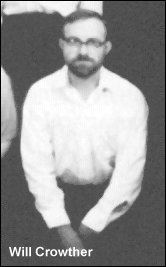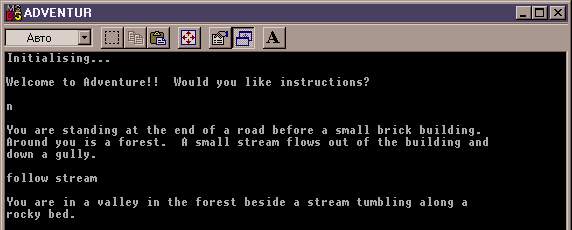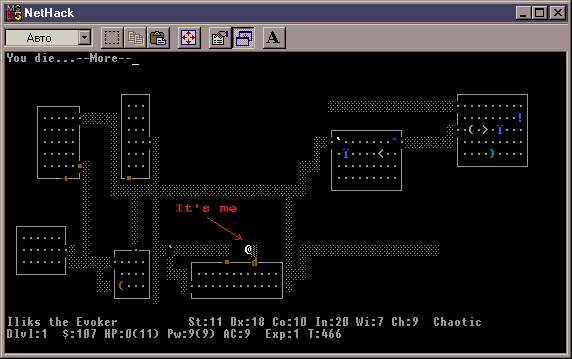if (Do you like Quake?==FALSE)
if (Do you like Diablo?==TRUE)
if (Are you tired with a new games which start to be boring?==TRUE)
if (Do you want to get the game you will play very long?==TRUE)
if (Do you know past of the game industry?==FALSE)
if (Do you want to know something about it?==TRUE)
{
Read the attached article;
Quit;
}
Attachment
--cut here--
1) How did it begin?
Do you think that the first computer games appeared in your C64 or Atari 2600 or NES? No, my fellow. It was much earlier, about ten years before this home computers era.
However, we should examine what the "computer game" word means. Those of you who first met computers about five years ago, probably will say that a computer game is graphic action, 3D in most of the cases, where you can control your character or mechanism while going to the goal. Right, but it is modern computer games. If you came to the PC world about a decade ago, you will say that computer games can be rather simple in graphic design and goals. And only the ones who met home computers about two decades ago will say that games were not graphical, in many cases. It can be astonishing for newbies but... Computer games began with TEXT GAMES.
Now let's dip into history and try to answer the paragraph's question.
The history of computer games began with the game "ADVENTURE". Lo, it was written in 1972! One computer freak (they were mostly scientists that time) liked to explore different caves with his wife. His name is Will Crowther.
 And his passion had led him to the wish to write a program with which you would be able to "roam" in virtual caves. He wrote it, on a PDP-10 computer in a Fortran dialect - the most popular language of that time.
And his passion had led him to the wish to write a program with which you would be able to "roam" in virtual caves. He wrote it, on a PDP-10 computer in a Fortran dialect - the most popular language of that time.
The program gained popularity among his daughters and was spread from friend to friend. Via an ancient kind of Internet, ARPANet (by the way, Will was involved in its support), this game travelled to many institutions. Can you imagine an engineer trying to install Adventure at his University's computer at night, risking to be catched while playing A GAME? :) However, the original Adventure was quite unfinished and "wet", filled by jargons of speleologs. Thus in 1976 Don Woods, who worked at the Stanford Artificial Intelligence Lab, made the attempt of finishing the game. He introduced some Tolkien stuff, due to the popularity of Lords of The Rings and Hobbit that time (look, it seems that almost all adventure games are based on Tolkien's books!).
After it Adventure was ported on UNIX, being rewritten on C.
As I said, Adventure belongs to the "text adventures" class. But what does it mean? Only the following: you don't see any graphics on screen, only text. It was due to the weakness of the computers of those days. You control your character not by joystick or keys, but via typing short phrases, which command a program to do something, e. g. GO NORTH, or simply N. Adventure had a weak parser (text analyser), it recognised words only by first four letters. Nowadays they can recognise even short sentences, like TAKE MATCH FROM TABLE AND LIGHT IT WITH MATCHBOX.
Do you want to see a screen of Adventure? Here it is:

Next, we should trace the development of text adventures on a home computers. As far as I know, text adventures were represented mainly on Spectrum, C64 and IBM PC machines. Note, that on the first two computers these games transformed to the kind of text adventures with some graphics. In my opinion, graphics influences more the perception in the game process. However, a lot of people don't think this way. And most of PC text adventures were and are only alphanumeric, without any graphics.
Also I should name one of the main founder of such games, Infocom company. It consisted of graduates of MIT University. They popularised these games greatly. Their first game, Zork I, offered a great dictionary, you could enter complex commands like those I named earlier. But as the time passed by, computers became more and more powerful, catchy action games appeared and text adventures slightly lost their positions. Many companies left this scene. And many fans were left alone, with their wish to play new games and the impossibility of doing this. So, in the end of the 80's this industry was in a big crisis. But finally a decision was made: fans decided to make games by themselves. So, this scene was reborn in the early 90's. Development packages appeared, which allowed users to create text adventures without programming knowledge. Obviously, these games became mostly freeware and they are keeping this tradition now. So, you know historical facts and now we can look at the concrete types of these games.
2) Pure text Adventures
As I said earlier, these games consist only of text. You command your character using the following commands: GO, EXAMINE, LOOK, TAKE, PUT, WEAR, SAY, INVENTORY and others. Many of them could be abbreviated, GO is usually omitted, you write only NORTH, SOUTH, WEST, EAST, UP, DOWN or simply their first letters. Use EXAMINE to, right!, examine some things in your inventory or in the surroundings. The game field is divided into small "rooms", or locations. LOOK gives you a detailed description of the current location. INVENTORY gives a list of objects you are carrying.
I must confess that these games require a good knowledge of English and a highly developed mind. These games are definitely not for illiterates. However, practise makes perfect, right? Some of this games, Worlds Apart for example, are very good in texts, however it took 3 years to the author to develop it.
Various compos are held sometimes, try to find them on the net if you are interested. Look, they are some kind of demoparties, if I'm not mistaken!
3) Rogue-like games
Wow, these games are definitely worth checking, if you like Diablo! More, they are really the first RPG games. They are named after the first game of this type, "Rogue". It was written at the very beginning of 80's, on a mainframe by students, Michael Toy and Glenn Wichman. They both enjoyed playing the Adventure but they realized the main disadvantage of it: all actions are strictly planned and there's no "forks" in story. They decided to make a game which they could play very long time without getting bored. And the magic word "random" appeared. Random numbers are the main principle of such games. They didn't want to make another adventure game but some "graphical" action. It was implemented via text mode. In Rogue you are a person who is pictured as @ symbol. The picture of the screen:

This screenshot was taken from the game Net Hack.
The whole game landscape is divided into levels. Each level occupies one screen and every time you play the game it generates new levels randomly. The game process has been changed - you don't have to solve puzzles, but have to train your character while fighting with other monsters. This concept really made a revolution in the "game industry" of that time (note, that there was no such industry that time). Rogue became the most popular game in students' campuses. So, now you know the roots of Diabolo.
Rogue wasn't the only game of this style. Now you could play the following greatest games, followers of Rogue: NetHack, Crawl, Ancient Domains of Mystery or ADOM, Moria and Angband. I named only the greatest hits. Trust me, they are worth checking! ADOM even took first place several years ago as the most popular freeware game. It tries to involve some kind of story into game, try it out. Crawl has a very big gamefield, which isn't shown on one screen. Angband is somewhat connected to Tolkien (however, not much) and features also graphics and sound. So, I recommend to try them out, they complement each other.
All of them can be downloaded from the first link in the following chapter.
4) Links
Good place to start - at least it was good for me.
http://www.stormtroopers.com/ZWR/adventur.htm
A huge collection of adventures, adventure developing systems and more -
ftp://ftp.gmd.de/if-archive
"Adventure" official homepage -
http://people.delphi.com/rickadams/adventure/index.html
Info about "Rogue" -
http://www.wichman.org/roguehistory.html
Online Java version of "Rogue" -
http://www.hexatron.com/rogue/
"Roguelike News" - dozens of rogue-like games!
http://www.skoardy.demon.co.uk/rlnews/